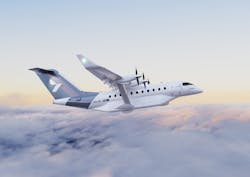Electric planes are taking flight
WASHINGTON - As convenient as flying may be, air travel is not great for the environment—by some estimates, commercial flights alone are responsible for 3 to 4 percent of all greenhouse gas emissions in the United States, Sarah Kuta reports for Smithsonian Magazine. Continue reading original article.
The Military & Aerospace Electronics take:
28 September 2022 - Kuta reports that last week, Air Canada became the latest airline to commit to trying the new, zero-emission technology by ordering 30 battery-powered passenger aircraft from the Sweden-based Heart Aerospace. United Airlines and regional provider Mesa Airlines each ordered 100 of the company’s planes in summer last year.
Carriers are looking at smaller electric aircraft as an inroad to the sector and hopefully scale up as the technology matures.
"We don't want to wait for 50 seats, 75 seats, 125-seat aircraft," said Mike Leskinen, president of United Airlines Ventures, to Reuters’ Allison Lampert last year. "We want to get involved now by investing in a company that we think has a big technological lead with the hopes of, over time, working with them to move the size of the aircraft to larger gauge.”
Related: United Airlines inks purchase agreement with eVTOL company Eve Air Mobility
Related: Volocopter's four-seater aircraft takes first flight
Jamie Whitney, Associate Editor
Intelligent Aerospace
